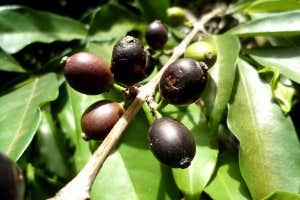
Black fruited 'Lost' coffee plant rediscovered in the wild and can resist climate change.
Share
A rare species of coffee has been found to have a similar flavor to the varieties favored by coffee growers for their high quality – but it is also more tolerant of the higher temperatures and more varied rainfall that are becoming increasingly typical of coffee-growing regions.
In dense tropical forests in Sierra Leone, scientists have rediscovered a coffee species not seen in the wild in decades - a plant they say may help secure the future of this valuable commodity that has been imperiled by climate change.
The researchers said on Monday that the species, called Coffea stenophylla, possesses greater tolerance for higher temperatures than the Arabica coffee that makes up 56% of global production and the robusta coffee that makes up 43%. The stenophylla coffee, they added, was demonstrated to have a superior flavor, similar to Arabica.
Stenophylla grows at a mean annual temperature of 24.9 degrees Celsius (76.8 degrees Fahrenheit) - 1.9 degrees C (3.42 degrees F) higher than robusta coffee and up to 6.8°C (12.24 degrees F) higher than Arabica coffee, the researchers said.
The stenophylla rediscovery, Davis said, may help in the "future-proofing" of a coffee industry that supports the economy of several tropical countries and provides livelihoods for more than 100 million farmers. While 124 coffee species are known, Arabica and robusta comprise 99% of consumption.
"The idea is that stenophylla could be used, with minimum domestication, as a high-value coffee for farmers in warmer climates," said Davis, head of coffee research at Britain's Royal Botanic Gardens, Kew.
Unlike the red and occasionally yellow fruit of Arabica and robusta plants, stenophylla's fruit are intense black. The coffee beans are inside the fruit.

"I think we're hugely optimistic for the future that stenophylla can bring," said Jeremy Torz, co-founder of the specialty coffee business Union Hand-Roasted Coffee in East London where part of the taste-testing was held.
